Claire Stevens's Blog, page 63
April 4, 2015
Angelfall by Susan Ee
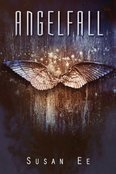 I was surprised at how much I liked this book! I’ve been burned by angel books before. Like the angels themselves, they seem to be all about the pretty covers but don’t have much actual content. Plus, I find it hard to get excited about a hero with wings. There’s something about the wings that just screams ‘not fanciable’ to me. But yeah, Angelfall surprised me.
I was surprised at how much I liked this book! I’ve been burned by angel books before. Like the angels themselves, they seem to be all about the pretty covers but don’t have much actual content. Plus, I find it hard to get excited about a hero with wings. There’s something about the wings that just screams ‘not fanciable’ to me. But yeah, Angelfall surprised me.Six weeks after the angels attacked Earth, what remains of humanity has been caught up in an angel-flavoured, post-apocalypse nightmare. 17 year old Penryn Young, her seven year old sister Paige and her schizophrenic mother are struggling to survive, caught between the dual threat of angels and street gangs. When Paige is kidnapped after they witness a group of angels sawing the wings off one of their own, Penryn heals the injured angel, Raffe, and they set off for the angels’ aerie to retrieve Paige and Raffe’s wings.
The plot was great. It’s proper old-school Book of Revelations stuff and there’s literally danger at every turn but Penryn never wavers in her determination to find her sister. There are avenging angels, human resistance groups, monsters, cannibals... Ee certainly knows how to keep things interesting.
The angels who have invaded earth are a perfect balance of terrifying and skeevy. Their reason for invading earth is that humans killed the angel Gabriel, but now they’re here they seem to be content holing up in swanky hotels, partying and getting busy with the human women who pimp themselves out to their oppressors.
And can I just say: Penryn = kick ass heroine! Everything that those drippy, save-me heroines out there lack, Penryn has in spades. The supporting characters had a lot of depth, too. I really liked Penryn’s mum. She’s a schizophrenic who’s off her meds and unstable as a result, but this seemed to give her an insight into the angels that the other characters didn’t have. The scenes between Penryn and her mum were very touching.
And I found myself actually liking Raffe and the lack of instalove was a big bonus for me. He and Penryn start off as enemies - obviously - and gradually start to trust and then like each other. Their relationship develops slowly and never feels rushed. I’m still not feeling the love for a guy with wings, but Raffe was a great character (agnostic angel, anyone?)
8/10
Published on April 04, 2015 12:50
April 2, 2015
'89 Walls by Katie Pierson
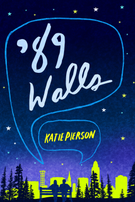 I received a copy of ’89 Walls in exchange for an honest review. Many thanks to Wise Ink and Netgalley.
I received a copy of ’89 Walls in exchange for an honest review. Many thanks to Wise Ink and Netgalley.’89 Walls tells the story of Quinn and Seth, two teenagers living in Lincoln, Nebraska, attending the same high school and the same social sciences class. Quinn comes from an affluent Republican background; Seth comes from a disadvantaged liberal background. Despite the fact that they clash regularly in class over their political beliefs, Seth has a huge crush on Quinn and eventually summons up the courage to tell her.
I should make a disclaimer here: I’m from England and I don’t know a whole lot about American politics, other than what I’ve seen on The West Wing (it’s a documentary, right?). I know that the Republicans are basically similar to our Conservative party and that the democrats are a kind of Labour/LibDem hybrid, and that’s about it.
I say this because ’89 Walls is a very political book. The author clearly has a defined (liberal) political agenda, which she incorporates into her writing. In addition to this, the class in which Quinn and Seth meet (and clash) is a social studies class where the kids and teacher discuss politics (and they discuss it with better-informed opinions than my friends and I did when we were at school!).
I thought the choice of year that the book is set in was very relevant. 1989 was an incredibly important year, politically-speaking. Even I know that. The Berlin Wall, Tiananmen Square, the first free elections in Poland, glasnost and the fatwah on Salman Rushdie. And yet, despite the fact that ’89 Walls is set twenty-six years ago, there are echoes of what happened then in today’s politics, especially with the current tension in Russia and the Ukraine and the rise of religious fundamentalism.
Against this political backdrop, Quinn and Seth go from being attracted to each other to forming a relationship, despite the differences in their opinions and backgrounds. I thought the way their relationship was written was incredibly sweet: the author doesn’t rely on instalove or love triangles to create tension (thank god); the tension is all about their material and ideological differences and having to figure out whether their beliefs are the right ones, or whether their relationship has changed their viewpoints.
I thought the author balanced her characters out nicely and showed really good character development. Quinn’s dad, a republican, could have been painted as a full-on bad guy complete with devils horns, but in fact Ms Pierson shows the reasoning behind his politics, in a kind of ‘This is why Quinn’s dad thinks this way. He’s not the antichrist, he genuinely thinks that his policies are the best ones for the American people.’ Similarly, Seth’s mum, a former activist and liberal, now suffering from MS, could have been painted as a saint, but actually she comes across as cranky and bigoted in her own way, especially when she assumes that Quinn is going to string Seth along and then dump him, purely because she’s from a wealthy background. All the characters in the book develop as the story moves along and all of them are challenged in their beliefs to some extent.
So here’s a question I kept asking myself: Would I have enjoyed the book as much if I didn’t agree with Ms Piersons political standpoint? I’m honestly not sure. I’m trying to imagine if I would enjoy a book that advocated pro-life as firmly as the author advocates pro-choice and I’m coming up blank.
All in all, though, I really enjoyed ’89 Walls. It made a refreshing change from a lot of the YA fiction that’s going around at the moment. It had a lot of layers and gave me a lot to think about.
8.5/10
Published on April 02, 2015 15:28
April 1, 2015
Amy and Roger's Epic Detour by Morgan Matson
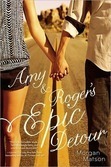 Aw. Amy and Roger’s Epic Detour is a lovely book. Maybe because I’m just off the back of Delicate Monsters, which shocked and disturbed me greatly, but Amy and Roger’s Epic Detour gave me the warm fuzzies.
Aw. Amy and Roger’s Epic Detour is a lovely book. Maybe because I’m just off the back of Delicate Monsters, which shocked and disturbed me greatly, but Amy and Roger’s Epic Detour gave me the warm fuzzies.The premise is that Amy’s family have recently suffered the loss of her father and she, her mother and her brother have basically splintered and each now live as far away from each other as it’s possible to be whilst still being on the continental U.S. Amy’s mother has just sold their family home and wants Amy to bring her car up from California to Connecticut. Trouble is, since the car crash that killed her dad, Amy is shy to get behind the wheel of a car again. Enter Roger... Roger doesn’t have anything like Amy’s tragic past, but he has his issues too and over the course of the book and an Epic Detour from the route plan Amy’s mother provided them with, they start to let go of the pain of their pasts and look forward to the future.
The plot is a kind of self-discovery thing, and also an America-discovery thing. I live in England, so there were points where I had to have my iPad next to me with a picture of the U.S. so I could work out where they were talking about, but that was a good thing. I learned stuff. There wasn’t instalove (good), I really liked Roger’s thing about explorers, and I really, really liked the ending and the way things between Amy and Roger panned out.
Amy was a great MC. She was witty and bright, even in the midst of grief and proved to be a great tourguide of the U.S.!
One of the only problems I had about this book was such a ridiculous thing, I don’t even know if I should mention it, but I’m going to anyway. Here goes:
My friend’s dad is called Roger.
Ach! I know you should look past a name to the character the author is trying to portray and focus on that, but every time I read ‘Roger’, all I could think was, ‘Roger, my friend’s dad’ and I got a picture of a middle-aged guy with a comb-over and a protruding chin.
And this totally isn’t the author’s fault: she doesn’t know Roger-my-friend’s-dad, but I couldn’t help it. I just kept picturing him.
Still, despite this I really liked Roger. I like it when an author doesn’t feel the need to have her male MC all brooding and mysterious and constantly leaving the female MC wondering if he likes her or if he’s off shagging loads of other girls, and gives some love action to the boy-next-door type instead. This is good. This is progress.
Okay, and while we’re on the subject of boys, can we get a WOOP! WOOP! DICKWEED ALERT! for Amy’s ex-boyfriend, Michael. Seriously, who takes their girlfriend’s virginity half an hour after her dad’s funeral? Who DOES that? Wankers, that’s who. And yes, I know she went over to his dorm room and I know she was begging for it, BUT YOU DON’T DO IT! Plus, also: why wasn’t he at her dad’s funeral. Why did he leave her to deal with it on her own? . Dickweed.
So in spite of the unfortunate-Roger-nomenclature and the duckweed ex, I’d still thoroughly recommend this book.
8/10
Published on April 01, 2015 14:05
March 31, 2015
Breakable by Tammara Webber
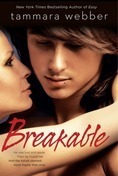 I’ve been burned in the past by reading books that show the same story as the original, just shown from a different viewpoint Walking Disaster>, and given how much I loved Easy, I was kind of nervous to read Breakable. What if Breakable was essentially going to be Lucas mooning about after Jacqueline, with his piercings and tattoos, riding around on his motorbike, flexing his biceps........
I’ve been burned in the past by reading books that show the same story as the original, just shown from a different viewpoint Walking Disaster>, and given how much I loved Easy, I was kind of nervous to read Breakable. What if Breakable was essentially going to be Lucas mooning about after Jacqueline, with his piercings and tattoos, riding around on his motorbike, flexing his biceps........I’m back. I so totally didn’t need to worry. Breakable is definitely a novel in its own right. It does tell the Easy story from Lucas’s POV, but that really only makes up 50% of the book and it doesn’t just re-hash what we already know. The rest of the book is Lucas’s back story, which was heartbreaking and compelling in equal measure. Rude, too. Goodness, that boy got around before he met Jacqueline. My word. I should also point out at this juncture that Unbreakable is most definitely a New Adult book, not Young Adult.
The story starts off where Lucas has just noticed Jacqueline in their economics class and starts sketching her. It’s a testament to Tammara Webber’s writing that she manages to make Lucas not sound like a creepy stalker all the time when he’s admiring Jacqueline from afar. From there, the book alternates between present day and a few years ago in the aftermath of his mum’s death. Getting in his head and seeing all his guilt, insecurities and self-doubt made for an emotional whirlwind.
You also see a lot of new characters - there’s a bit more about Lucas’s relationship with Dr Heller and the other Hellers, the girls at the coffee shop and even some brand new characters. So yeah, for a re-telling, Tammara Webber has managed to keep the story very fresh.
I rarely re-read books, so the fact that I’ve re-read this and skimmed through it a third time speaks highly. If you enjoyed Easy, you should definitely take a look at this one.
9/10
Published on March 31, 2015 03:33
March 30, 2015
Delicate Monsters by Stephanie Kuehn
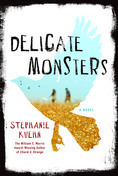 I was given a copy of Delicate Monsters in exchange for an honest review. Many thanks to St Martins Griffin and Netgalley.
I was given a copy of Delicate Monsters in exchange for an honest review. Many thanks to St Martins Griffin and Netgalley.This was not a comfortable read. Bizarre and compelling, but definitely not comfortable.
Delicate Monsters is written from three perspectives: those of Sadie, Emerson and Miles, three disturbed teenagers whose lives intersect and whose fates seem intertwined. Sadie Su has just been kicked out of boarding school for almost killing a fellow student. She returns to her family’s vineyard in Sonoma and enrolls at the local high school where she meets Emerson, a boy she used to know as a child, and his brother Miles.
Sadie is a psychopath. Completely emotionally detached from those around her, she doesn’t care what people think about her, she has no empathy whatsoever, she almost killed a fellow student at her old school, she has no trouble lying to get what she wants and doesn’t feel remorse, shame or guilt.
Sadie wandered out to the main road and waited for cars to pass so that she could throw rocks at them.
She does have some small redemption at the end, but other than this she is terrifying and her emotional vacuum meant that I didn’t connect with her as a character. I was always curious to see what she’d do next, but ultimately she could have lived or died and I wouldn’t have cared either way. Actually, scrub that: I just wanted her to die so that the world could be rid of such a horrible person!
Emerson displays very disturbing tendencies as well. Arguably, his behaviour resulted in some part from the death of his father but not every child who loses a parent does the kinds of things he did. When he was ten, he cut the legs off a frog and masturbated as he watched it die on the ground. As an older teen, he gets the girl he is seeing to lay on the floor and pretend to be dead so he can do the same thing. He drink drives, he’s racist and he doesn’t care that his brother is being beaten by the school’s homophobic bullies. Like Sadie, I was torn between not caring what happened to him and wanting him to meet a sticky end.
Delicate Monsters left me wondering if the author has something against the townspeople of Sonoma. Seriously, there’s only one person in the whole book who seems to have any redeeming features - May - and at times it just seems like she’s there to act as a foil to the unpleasantness of all the other characters! Even poor Miles, who suffers under the weight of the visions he sees and is bullied mercilessly, saw visions of the Boston marathon bombing and the Japanese tsunami and let it all play out without attempting to warn anyone.
People kept dying and people kept suffering, even when he knew about it ahead of time.
Delicate Monsters plays out kind of like a soap opera, or The Jeremy Kyle Show. The writing is more graceful, but you still get the sense of watching awful people doing horrible things and you can’t quite bring yourself to look away. It’s completely compelling and leaves you wanting to take a shower afterwards.
I have to say, I didn’t enjoy reading Delicate Monsters (and I have a feeling that was the author’s intention) but I didn’t seem to be able to put it down either. I’d recommend this book for anyone who likes their YA very dark indeed.
7/10
Published on March 30, 2015 02:37
March 29, 2015
Perfect Lies by Kiersten White
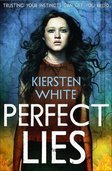 I received a copy of Perfect Lies in exchange for an honest review. Many thanks to HarperCollins and Netgalley.
I received a copy of Perfect Lies in exchange for an honest review. Many thanks to HarperCollins and Netgalley.This is book two in the ‘Mind Games’ duology. I didn’t enjoy it quite as much as Mind Games, but it was still a good read.
The story is told from alternating POVs of sisters Annie and Fia and picks up where Mind Games left off. It’s very tense because Annie’s POV is happening before Fia’s, so it gets a bit mind-boggling at times, but it does come together well at the end.
I really liked Annie and Fia as characters: Annie gets a lot stronger in Perfect Lies and Fia still struggles to know right from wrong.
“Sometimes you scare me.”
“That’s because you don’t really know me yet.” I hold out my hand to her. “When you really know me, I’ll scare you all the time.”
Kiersten White’s writing is kind of austere and you are left to fill in a lot of gaps in description yourself. I quite liked this, though as I think some books can go overboard on cinematic descriptions.
All in all this was a satisfying conclusion to Annie and Fia’s story.
8/10
Published on March 29, 2015 03:01
March 28, 2015
Down from the Mountain by Elizabeth Fixmer
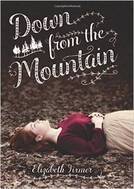 I received a copy of Down from the Mountain in exchange for an honest review. Thanks to Albert Whitman Teen and Netgalley.
I received a copy of Down from the Mountain in exchange for an honest review. Thanks to Albert Whitman Teen and Netgalley.Down from the Mountain tells the story of Eva, a fourteen year old girl who lives on a ranch in Colorado with her mother, her best friends Annie and Jacob, a dozen or so additional mothers and the Prophet Ezekiel, God’s representative on Earth and the one man chosen to lead four hundred and forty-four souls straight to the gates of Heaven, come the end of days.
Yes! Eva lives in a crazy cult!
Gotta say, I find the whole concept of cults fascinating, so I was really excited to read this book. The plot is a bit of a slow burner to begin with and there’s a lot of description about life in the cult, about the constant praying and fasting and so on, but it picked up a lot in the second half and rattled along quite excitingly.
I liked Eva immensely as a main character. She was very intelligent and was devoted to her mother, despite the fact that they were forbidden from having a close relationship with each other. I liked the way Eva was torn between life on the Righteous Path and her natural curiosity about the outside world. She’s had it hammered into her from the age of four that life as a ‘heathen’ would mean the loss of her eternal soul, and all she wants to do is be a good disciple, but she is increasingly enticed by the world outside the compound she lives on and suspicious of Prophet Ezekiel’s motives.
The thing I didn’t really get was why everyone chose to follow Ezekiel. From the first page, he just comes across as terrifying and creepy and the kind of guy you’d just want to run a billion miles from. I understand cult leaders are really charismatic and manipulative and that they prey on people who are vulnerable, but Ezekiel was just horrible to everyone. I wasn’t really getting any charisma or manipulation, just bullying. I didn’t understand how he managed to convince all those women to leave their husbands and marry him instead! Also, how were they all okay with him living in luxury while everyone else basically lived in a barn? I guess the manipulation went on behind the scenes, but I would have liked to have seen more of it.
I thought the writing was very gripping, and the author dealt with the whole dichotomy between ‘people who are religious’ and ‘people who do crazy things in the name of religion’ sensitively. I would definitely recommend this book.
7.5/10
Published on March 28, 2015 16:07
Before I Fall by Lauren Oliver
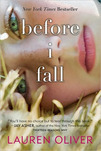 It’s so hard to explain why I loved this book so much, bearing in mind that the main character is basically a nasty bully, but here goes...
It’s so hard to explain why I loved this book so much, bearing in mind that the main character is basically a nasty bully, but here goes...Imagine if you could do over the last day of your life until you got it exactly right? What would you do differently? That’s the chance Samantha gets when she’s involved in a fatal drink-driving accident on her way home from a party. She’s at the top of the pile in her high school, wielding masses of social power, and yet the last day of her life shows her exactly how much power she has.
I started off absolutely despising the characters in Before I Fall. God, they’re horrible! Really dreadful. And yet I kept reading because Lauren Oliver’s writing is just so superb. She’s descriptive enough to keep you interested and engaged and she keeps Samantha and her friends just human enough for you to keep caring about them. The things they get up to are basically any parent’s nightmare.
Although the book is written from Samantha’s POV, you also get a real feel for the poor girl they pick on, Juliet Sykes. I was never bullied at school - thank Christ - and I was never a bully either, but holy crap, at some points it really feels like you’re the one Samantha and her friends are bullying.
There’s some romance in Before I Fall and it keeps you wondering whether, if Samantha finally manages to play out the last day of her life the way the fates want her to, they’ll finally end up together. Kent’s kind of gawky and seriously uncool but you can tell that once the nightmare of high school is over and he’s had a chance to grow into his character and talents, he’ll be fighting the girls off with a shitty stick.
Before I Fall raises so many questions about how the things we do affect other people, even tiny things that from the outside look totally inconsequential. It’s young adult and marketed as such, but it ought to be required reading for everyone.
10/10
Published on March 28, 2015 10:47
March 27, 2015
Eleanor and Park by Rainbow Rowell
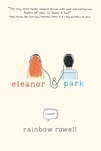 Eleanor and Park are both outcasts in their own ways. Eleanor is the new girl in school. Chubby and awkward with bright red hair and bizarre clothes, she is the target of bullies - on her very first day, she gets the Forrest Gump 'You can't sit here' treatment on the school bus. On top of this, she has an abusive home life and evil sex-pest stepfather to contend with. Park's home life is happy enough - his parents both love him and love each other - but he struggles with being half-Korean in a school that he describes as 'seriously white' and liking obscure music and comics that no one else seems to get.
Eleanor and Park are both outcasts in their own ways. Eleanor is the new girl in school. Chubby and awkward with bright red hair and bizarre clothes, she is the target of bullies - on her very first day, she gets the Forrest Gump 'You can't sit here' treatment on the school bus. On top of this, she has an abusive home life and evil sex-pest stepfather to contend with. Park's home life is happy enough - his parents both love him and love each other - but he struggles with being half-Korean in a school that he describes as 'seriously white' and liking obscure music and comics that no one else seems to get.I went into this book thinking it would just be a love story, but it’s so much more than that. It also deals with subjects like bullying and acceptance and abuse with a lot of sensitivity.
Eleanor and Park as a love story itself didn't set my heart pounding, but it was very sweet nevertheless and also kind of slow-moving (this is a good thing - instalove is a bugbear of mine). They seemed to know that first love rarely lasts but they give it a shot anyway. I liked them as a couple - they were very sweet - but I felt they were strong enough characters to keep the story interesting even without the romantic element.
And can I just say: Rainbow Rowell's writing *sighs*. Seriously, how many authors come up with a paragraph like this:
Eleanor was right. She never looked nice. She looked like art, and art wasn't supposed to look nice; it was supposed to make you feel something.
And how about this:
Holding Eleanor's hand was like holding a butterfly. Or a heartbeat. Like holding something complete, and completely alive.
Awww!
9/10
Published on March 27, 2015 07:29
March 26, 2015
How to Save a Life by Sara Zarr
 I'm not sure I would have picked this up had Amazon not kept pushing it at me, but I'm really glad I did.
I'm not sure I would have picked this up had Amazon not kept pushing it at me, but I'm really glad I did. How to Save a Life tells the story of Jill, whose father has died leaving a gaping hole in her and her mother Robin's lives. Jill's solution to her grief is to retreat into a little ball of hurt and anger, lashing out at anyone who comes too near. Whereas Robin's solution is to adopt a baby...
Enter Mandy. Neglected by her mother, Mandy forms inappropriate attachments with complete strangers. Pregnant with a baby who could be the result of sexual abuse, Mandy's only thought is to give it up for adoption.
I really enjoyed How to Save a Life. Told from the dual perspectives of Jill and Mandy, it's a gentle, emotional read, and despite the difficult subject matters it never leaves you feeling raw. Sara Zarr paints both the protagonists perfectly, really letting you get into their characters.
For a book that on one hand is about the way people deal with grief over the death of a loved one, and about teenage pregnancy on the other, it would have been so easy for Sara Zarr to have made this overly melodramatic, like one of those awful made-for-TV films they show in the afternoons. Instead it's very restrained but still manages to make you care about the characters.
And the ending is just adorable.
8.5/10
Published on March 26, 2015 08:53
Claire Stevens's Blog
- Claire Stevens's profile
- 41 followers
Claire Stevens isn't a Goodreads Author
(yet),
but they
do have a blog,
so here are some recent posts imported from
their feed.



